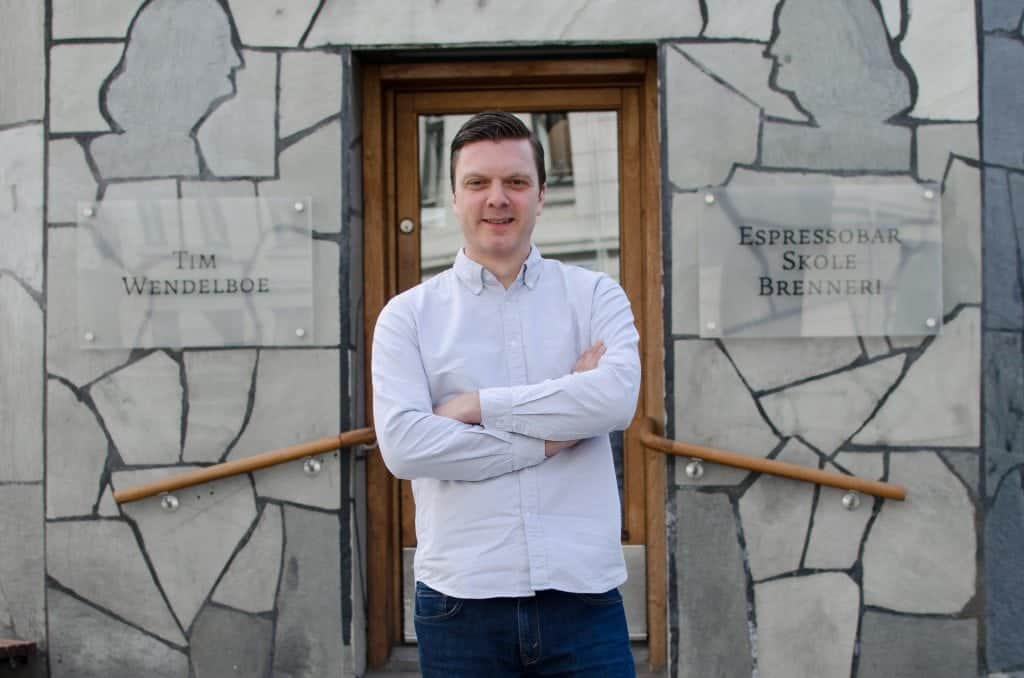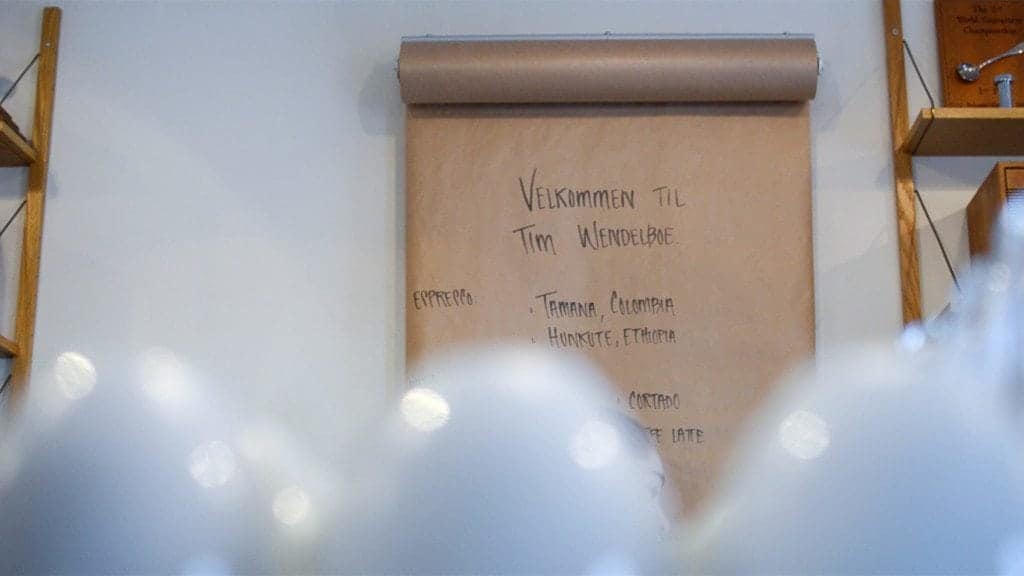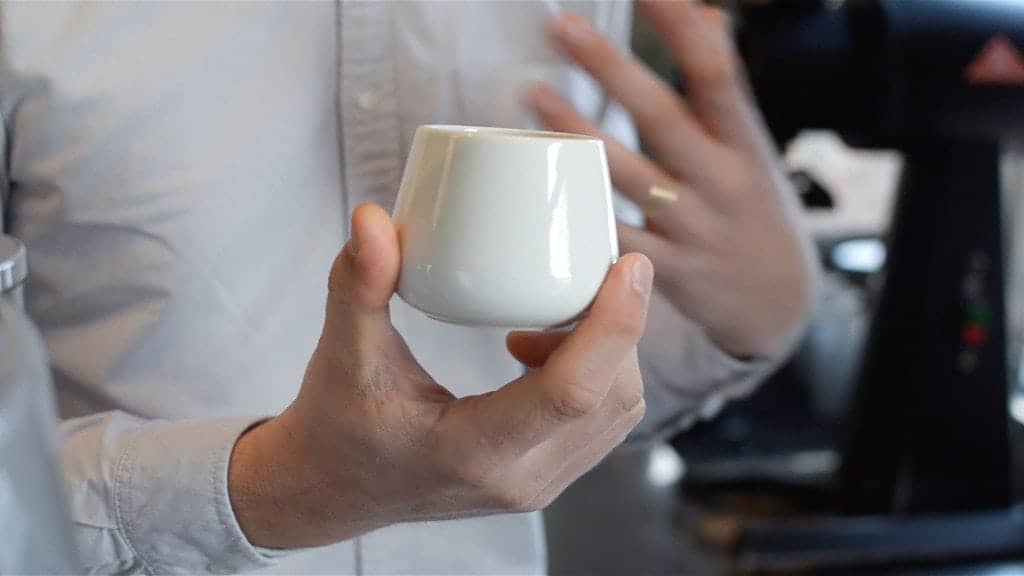Tim Wendelboe is World Barista Champion 2004 & World Cup Tasting Champion 2005. He runs a coffee roastery, espresso bar, and coffee school in Oslo, Norway. Since 2015 he also contributes with his knowledge to farming, since he bought a coffee farm called Finca el Suelo ( meaning the soil) in Huila department, Colombia. We interviewed Tim in front of his cafe in April, on our trip through Oslo’s cafes. Here are some questions that we asked him on the behalf of you, our readers!
What is your recommended practice for any sensory improvement? Where does a beginner start and a skilled taster progresses?
[etf uppercase=”true” format=”block” tablet_sf=”” mobile_sf=”” font=”” font_size=”” lheight=”” lspacing=”” color=”” ]QUESTION #1 (Karolina Kumstova, Berlin)[/etf]Well, for a beginner taster, tasting with other professionals has been the best way to do it. I was cupping with the old cupper, called Per, at Solberg & Hansen in my beginning. He was not necessarily good at describing coffees but he was very good at explaining why coffee was better than another and so on. To be able to describe the flavors came to me once when I tasted a Kenyan coffee, George Howell’s actually, in Boston in 2003. I had been cupping for like a year and I tasted his coffee and it tasted like blueberry and blackberry and I had never tasted that before in a coffee. That’s when I realized, that when people say: “this coffee tastes like jasmine”, that’s what they’re talking about.
Today, it’s much easier for me, because I taste not only coffee, but many different products. So when I taste cheese I try to describe what that cheese tastes like, without saying cheese. Roquefort might be very fruity, nutty, a goat cheese can taste like sweaty animals, or like sheep. Beers, IPAs, can be fruity. Dark beers they can actually taste like coffee. So I think, for a beginner taster, it is about starting to taste everything; wine, beer, cheese, coffee, apples, strawberries. Try to have more than one product at a time. If you’re tasting beer for instance, don´t open one beer at a time, open them at the same time and compare them. It’s much easier, if you have something to compare with. That’s also my tip for the advanced tasters.
Talk to sommeliers, start tasting with chefs. Tasting with professionals will always expand your knowledge. What I am trying at the moment is to be more objective when I cup. In any given coffee tasting, everyone will always find the best coffee, so if you have a table with ten coffees, there will always be the best one on that table, but it might not be a very good coffee. To be able to analyze the coffee, regardless of the other coffees, and giving it a fair score. If I put only a seventy five point coffee on the table and then an eighty point coffee on the table, people might score that eighty point coffee by ninety points. Because they are not analyzing it. They just think: “This is so much better, let’s give it ninety points.” Using the forms properly – how is the mouthfeel? Is it clean? How is the acidity? Is it pleasant? Morten Wennersgaard, who runs Nordic Approach, is very good at isolating the coffee on the table. I feel I am very often affected by the other ones on the table.

Is there any key factor that can help us spot defects in coffee?
[etf uppercase=”true” format=”block” tablet_sf=”” mobile_sf=”” font=”” font_size=”” lheight=”” lspacing=”” color=”” ]QUESTION #2 (Fernando Porres, Madrid)[/etf]Well, there are many aspects. First of all, look at the green coffee and smell it. If it smells bad, like earth, it´s probably dried on soil. Or you can look at the beans, they should be even nice color. Of course, after you roast it, it´s difficult to look at the beans, you can still see if there has been broca [Coffee Berry Borer], broken beans or Quakers, the ones that are very light after roast, and smell like peanuts.
But when you taste the coffee, it takes a little training. A lot of times especially over fermented coffees can be very desirable for people at the beginning, because they are very fruity. For me, most natural coffees taste like over fermented washed coffees. But lots of people like that, so there is nothing wrong with liking it, for me, it is uninteresting flavor, because I tasted it many times. The flavor is the same, regardless if the coffee is from Brazil, Sumatra or Kenya.
Actually I took a class at SCAA many years ago, called tasting defects. And that was really good, because then you taste a phenolic cup, an over fermented cup, you taste woody cups and it´s very easy to spot afterwards, because you know that flavor, you just remember it very effectively. But if you are not experienced in this, it´s very difficult, I guess. A lot of times, especially woody coffees, old coffees, are served, because people do not notice it.
For instance now, it is April, there is not a lot of fresh coffee around, so most of the coffees are slightly woody. You do not really notice it, but if you put a fresh crop of coffee on, then you would taste it. We still have this experience in our cupping lab. So I would say, go to the defect tasting, that is the best thing to do, and if you cannot go to the defect tasting, contact an exporter and ask them to just send some defected coffee, like over fermented, phenolic and so on. That is the easiest way to learn how to spot this.
What was the trigger to spend the life searching for better coffee?
[etf uppercase=”true” format=”block” tablet_sf=”” mobile_sf=”” font=”” font_size=”” lheight=”” lspacing=”” color=”” ]QUESTION #3 (Tiago Dias, Lisbon)[/etf]I still haven’t decided if I am going to spend the rest of my life working in coffee but now it looks like I am going to. I never took that decision actually. I just love to work in coffee so that is what I do. If I stop loving it I will stop working in coffee.
I have also changed my job over time. I started as a barista, then I sort of managed the store, I competed a lot and then I ran a Stockfleths chain with a friend, I was sort of focusing on product development and quality control and training. I was freelancing before I opened this store, when I started roasting. So it has been constantly changing, and that is probably why I am still in coffee. I am learning a lot everyday and it changes a lot, it keeps it interesting.

Why single origin espresso? What are pros and cons?
[etf uppercase=”true” format=”block” tablet_sf=”” mobile_sf=”” font=”” font_size=”” lheight=”” lspacing=”” color=”” ]QUESTION #4 (Radoslav Plešinac, Serbia)[/etf]The con is that if you don’t have a good quality coffee, it does not taste good and you cannot cover it up. You can cover it up with over roasting or something. The reason why I stopped blending is I don’t find it interesting, intellectually. I would like to taste what variety I am tasting, where the coffee is from, how it is processed. That is what I want to taste. That is why I stopped blending, because I spent a lot of time at the farm level, planting the varieties and developing the quality. And I want to be able to taste that. If you then blend it with something else, you won’t be able to taste it. That is why we stopped doing it.
I also think, if you have a great quality coffee it is complex, sweet, balanced, if you brew it well and roast it well, so there is no need for blending it. If I would buy really great bottle of wine from France or from a specific vineyard and I wanted to make this more complex, so I would take some Australian wine or Italian wine and mix it in there. It doesn’t make sense to me. However, I was just in Honduras and one of the farmers mixed two varieties together, we roasted it and it tasted amazing. So blending does not have to occur in the roastery, it can also occur at farm level. So nothing against blending, I just don’t prefer to drink that, because I don’t find it that interesting.
How do you manage all the tasks and jobs you do, roasting, farming, running a cafe, education. Do you have a time machine?
[etf uppercase=”true” format=”block” tablet_sf=”” mobile_sf=”” font=”” font_size=”” lheight=”” lspacing=”” color=”” ]QUESTION #5 (Honza Malec, Prague)[/etf]It is difficult to manage everything on a good level, I think. Of course, I am not alone in this, I have a fantastic team that works in the store, with very responsible people, a great bar manager, great wholesale managers, roasters, responsible people. The store itself, we have a very good system, everyone knows what to do every day. If something happens, if I am in Colombia, they have to fix it themselves. I think if you empower your employees to take the responsibility, then the store is more or less self-running. Yes, for developing new drinks I have to be the driving force behind that, but you don’t have to do that every day.
For me making great coffee has a lot to do with routine, it’s about being consistent, have good systems, making sure everyone knows what to do and follows the routines. Then we can focus on customer service experience. Without my team here, I couldn´t travel at all. When I started at Stockfleths I realized, you have to have very good systems that people follow, no exceptions. They have to follow, in order to let the store not run you. You are trying to work preventively, instead of fixing problems all the time. So then you can travel!
Also, in Colombia there is not much to do now, the trees are this big (showing about 30 centimeters), they are not having any fruit. The only thing I need to do is to make compost, which takes two to three weeks. I do that three times a year, applying the compost while I am there. We hire some staff to do that. Then it is just cutting some weeds, and if we have to plant more trees, they will do that while I am not there, you just hire people to do that. Of course, the management and planning is what I do. So thinking of making yourself not needed in the store, or at the farm, is probably the ideal, so you train people to do your job so you can manage it.
What is the most important thing when building a relationship with a farmer, meaning Direct Trade relationship, and how to achieve it?
[etf uppercase=”true” format=”block” tablet_sf=”” mobile_sf=”” font=”” font_size=”” lheight=”” lspacing=”” color=”” ]QUESTION #6 (Damian Durda, Berlin)[/etf]It is as simple as dating. You have to find the right person that you enjoy the company of. Being an honest, open-minded, decent person and then, if you find people that you like and they are the same, then you are developing a relationship. It’s not like I am going to Colombia to develop relationships. You meet people, you maybe work with one farmer a couple of years, and it turns out you don’t have that kind of connection personally, or he doesn’t believe in the same ideas that you do, so you finish the relationship, and you start with a new one. So it is a little bit like dating, it needs to be the right click.
Also having great staff, I’ve had a lot of great staff, people develop and then after five years, they might have different desires, different ideas, so you decide to separate, or they decide to quit. But it doesn’t mean you are not friends, life changes. So it’s an ongoing thing. For me, I have been very lucky to find great producers to work with, that I have been working with for a long time. I think it’s a matter of communicating, more often than once a year, exchanging ideas and listening to what they have to say. But they also need to be willing to listen to what you have to say. It’s a two-way street, I think.

You are one of the leaders in the industry. However, everyone has a guilty pleasure. Do you rebel sometimes?
[etf uppercase=”true” format=”block” tablet_sf=”” mobile_sf=”” font=”” font_size=”” lheight=”” lspacing=”” color=”” ]QUESTION #7 (Michal Stec, Brno)[/etf]When I am in Italy I actually enjoy drinking espresso with sugar. Although it is not a great quality, it has that Italian taste that I kind of enjoy. I am not searching for the best espresso, when I am there. It’s part of the culture I enjoy, just being in an Italian espresso bar, watching the culture and drinking the espresso, without having to analyze it too much. It is probably my guilty pleasure in coffee. About the other things, I used to eat a lot of candy, I don’t do that anymore (laughs). Sugar is not very good for you, in excess at least, so I am trying to lay that off, after many years, and I used to watch the television all the time. I was a slave of television but now I am tired of that as well.

